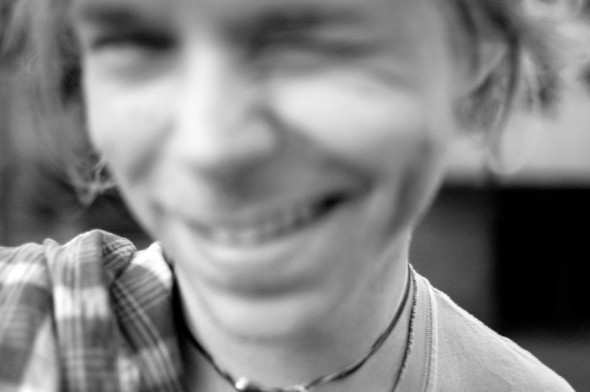
Photography Bárbara Soto
For years, Brooklyn’s Black Dice has made all kinds of racket: minimalist, beat-centric cerebral dance constructs that have led them ahead of the avant-electro rock pack, if there is such a thing. Original Dice roller Eric Copeland has been busy over the last two years, constructing, poaching and recording his seventh studio album. The latest project, Repo, is not only a fine addendum to the Black Dice catalog, but is also a record that continues drawing on the tradition of piece-mealing sounds together in what Copeland is calling Alien in a Garbage Dump. Copeland’s work is an array of complex samples, live instrument recordings and voiceovers that sound as creepy as they do alien.
When it comes to his process, Copeland says, “I just hang out, check out some sounds, see what I respond to, and take it from there. Once I have one thing I like, I just keep going until I reach a point of mystery I guess—something that doesn’t immediately explain itself but is still moving with some momentum. And then I try to tie it all together.”
This process of building up and working with a rather systematic series of layering is reminiscent of the fundamental concept of collage. Part of Black Dice’s career has been steeped in the visual besides the aural; their videos are a cross between giant raver-inspired visuals and psychedelic screen savers. Their packaging seems to follow this trend, with album covers that look like the video game Tetris was taken apart and pasted back together by six-year-olds with magazine scraps at their disposal.
Copeland doesn’t necessarily dismiss or embrace the notion that these are aesthetic choices. “Collage is a pretty general idea in my mind and I just do what I can to make things that I like and feel are important,” he says. “The idea of collage being so broad does allow us some freedom to check out other ideas of creating and making things relate in new ways.”
Alien in a Garbage Dump has been a transformative process, with songs that are noticeably shorter than previous Black Dice tunes, drifting away from the dub influences they’ve focused on in the past. While Copeland’s solo work is rooted in such Black Dician traditions, the sounds are carefully crafted so that the underlying goal is to keep the audience guessing. “To be honest, I like the grey area, where you are engaged in two or more ways. My brain has to figure out questions to ask, and the audience has to figure it out on its own,” he says.
Spoken like someone who is truly immersed in visualization. But in this regard, Copeland gives credit to his brother and Black Dice cohort, Bjorn Copeland. “He is my main inspiration for doing my own things, as well as being a big supporter,” he says. “As of the past few years, we’ve been more involved alongside him, and that has been a real step in our work–—just for the freedom entailed.”
As Copeland moves into more of his own territory, and continues creating music that challenges listeners, the notion of not having any direction has fallen to the sidelines, rather there is a willingness to construct material until it’s done in his eyes. That, of course, isn’t a cut and paste process. “A lot of it is just learning to not be precious with something and to really let go,” he says. “That is my main ambition most of the time.”
– Michael D. Ayers

